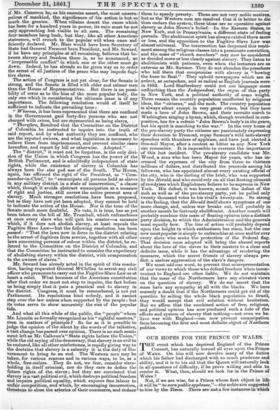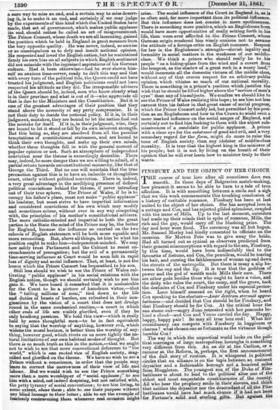OUR ROPES FOR THE PRINCE OF WALES.
MHE event which has deprived England of the Prince 1 Consort, has naturally turned all eyes upon the Prime of Wales. On him will now devolve many of the duties which his father had discharged with so much prudence and ability, and it is to his aid that the Queen will naturally look in all questions of difficulty, if he prove willing and able to render it. What, then, should we look for in the Prince of Wales ? Not if we are wise, for a Prince whose first object in life it will be" to earn public applause,"—the noble aim suggested to him by the Tunes. There are not a few instances in which a sure way to miss an end, and a certain way to miss deserv- ing it, is to make it an end, and certainly if we may judge by the experiments of this kind which the United States have made, that art of government, which makes public applause its end, should rather be called an art of misgovernment. The Prince Consort, whose death we are all lamenting, gained the position which he held in England in great measure from the very opposite quality. He was never, indeed, so unwise or so unscrupulous as to defy and insult national opinion. lie respected and loved the English nation, but he maintained firmly his own bias on all subjects in which English sentiment did not coincide with the ingrained aspirations of his German culture. Had it been otherwise—had he ever shown him- self an anxious time-server, ready to drift this way and that with every turn of the political tide, the Queen could not have trusted his judgment, and English politicians could not have respected his attitude as they did. The irresponsible advisers of the Queen should be, indeed, men who know clearly what is in their province and what is out of it—who appreciate all that is due to the Ministers and the Constitution. But it is one of the greatest advantages of their position that they stand above the necessity of any party compromise. It is not their duty to decide the national policy. If it is, in their judgment, mistaken, they are bound. to let the nation find out the mistake for itself. If it is, in their judgment, wise, they are bound to let it stand or fall by its own inherent strength. But this being so, they are absolved from all the peculiar temptations of constitutional statesmen, and are bound to think their own thoughts, and make up their own minds, whether these thoughts fall in with the general current of popular opinion or not. Such an atmosphere of independent conviction near the throne is exceedingly desirable. There may, indeed, be more danger than we are willing to admit, of a partial return towards unconstitutional monarchy, like that of George the Third. But no one will maintain that the true precaution against this is to have an. imbecile or thoughtless court, utterly without political conviction. There is, indeed, a very great advantage in the modifying presence of defined political convictions behind the throne, if never intruding out of their true sphere. The Prince of Wales, if he is to occupy his father's place, must not make "public applause" his loadstar, but must strive to have impartial information and considered convictions of his own which may modify and sometimes colour, without ever in any way competing with, the principles of his mother's constitutional advisers. The more catholic-minded and impartial to both the great parties in the State the mind of the Prince may be, the better for England, because the influence so exerted on the two schools of English statesmen will be both more equable and more reconciling. But, above all things, let him be what his position ought to make him—independent-minded. We may now safely trust Parliament and the Cabinet to resist en- croachments of prerogative; but the evil of a permanently time-serving influence at Court would be soon felt in rapid loss of dignity and social influence. That, at least, is not the lesson which the Prince Consort has bequeathed to his son.
Still less should we wish to see the Prince of Wales cul- tivating "public applause" in his social relations with the English nation, though we should certainly wish to see him gain it. We have heard it remarked that it is undesirable for the Court to be a picture of humdrum virtue,—that the "toiling millions of men," tied down to the life and duties of beasts of burden, are refreshed in their ima- ginations by the vision of a, court that does not drudge round in the same mechanical routine,—a court in which other ends of life are visibly glorified, even if they be only headlong passions. We hold this view—which is really held by some thoughtful men—to be in fact equivalent to saying that the worship of anything, however evil, which widens the moral horizon, is better than the worship of any- thing, however good, which rivets on us more tightly the na- tural limitations of our own habitual modes of thought. But there is so much truth as this in the notion,—that we ought not to wish to see that mere conventional deference to "the world," which is one rooted vice of English society, mag- nified and glorified on the throne. We have no wish to see a Prince without a conscience, in order that the people may learn to correct the narrowness of their view of life and labour. But we would wish to see the Prince something more than a mere worshipper of "social applause ;" to see him with a mind, not indeed despising, but not satisfied with, the petty tyranny of social conventions ; to see him living, to some extent, above them ; able to see their purpose without any blind homage to their letter ; able to set the example of fearlessly contravening them whenever real occasion might arise. The social influence of the Court in England is, as is so often said, far more important than its political influence. But this influence does not consist in mere spotlessness. There is something more positive, which an Englishman born would have more opportunities of really setting forth in his life, than were ever afforded to the Prince Consort, whose German origin rendered him wisely anxious not to assume the attitude of a foreign critic on English manners. Respect for law is the Englishman's strength—slavish legality and formality in social matters is the weakness of our middle- class. We think a prince who should really be to his people "as a hiding-place from the wind and a covert from the tempest, as the shadow of a great rock in a weary land," would incarnate all the domestic virtues of the middle class, without any of that craven respect for an arbitrary public opinion which vitiates so much of our national morality. There is something in a prince's position which justifies the wish that he should be lifted higher above the "service of men's eyes" than any of his subjects. We confess we should like to see the Prince of Wales realizing this hope ; to see him not less earnest than his father in that great cause of social progress, which the Prince Consort nobly led, but permitted by his posi- tion as an Englishman and hem to the Crown to wield even a more marked influence on the social usages of England, and certainly not to find him looking to them with the abject sub- missiveness of a candidate for public applause. A prince with a clear eye for the substance of good and evil, and every secondary regard for the form, might do more to raise the tone of E gush society than any idolater of middle-class morality. It is true that the highest king is the minister of his people ; but it is not by living on the breath of their opinion that he will ever learn how to minister truly to their wants.































 Previous page
Previous page